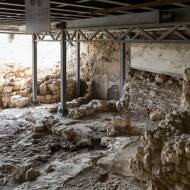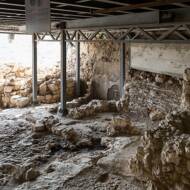
OFF THE BEATEN TRACK: Top 10 Things You Didn’t Know About Jerusalem

There is so much to learn about Jerusalem – past and present.
By Nosson Shulman, Licensed Tour Guide
Recently, Israelis celebrated Jerusalem Day, a holiday commemorating the Israeli Defense Force’s miraculous liberation of Jerusalem during the 1967 Six Day War. For the first time in Millenia, Jews were once again in control of the world’s holiest city that G-d gave to His people. In honor of this celebration, here are some interesting facts and statistics about the Holy City that you may not know:
1) Jerusalem is Israel’s largest city in population
Jerusalem, Israel’s eternal capital, currently has approximately 970,000 residents, double the population of Tel Aviv (Israel’s second largest city) that now has around 450,000 residents, although the Metro Tel Aviv area is much larger with a population of about 4,421,000.
2) It is estimated that by 2024 or 2025, Jerusalem will become Israel’s first city to have at least one million residents living within its municipality.
Though there are several metro areas of Israel (which consist of multiple municipalities) having more than a million residents including Tel Aviv (4,421,000), Jerusalem (1.4 million) and Haifa (1,179,000), no single municipality on its own has reached that number yet. If by the next Jerusalem Day celebration, Israel’s capital hasn’t reached that milestone, it is predicted that by 2025 celebration, they will almost certainly attain that number.
3) Although Jerusalem is a Jewish majority city, it also has a large Muslim and Christian population
In 2021, Jerusalem had 590,000 Jewish residents and 374,900 Arab Residents (362,000 were Muslim, 12,900 were Christian). There were 3,500 non-Arab Christian residents and 10,500 who did not divulge their religious background.
4) The majority of Jerusalem’s Jewish population are religious
When looking at Jerusalem’s Jewish population (aged 20 or older), 35% identified as Charedi (Ultra Orthodox) while another 20% identified themselves as being religiously observant. A further 25% of residents identify as traditional. Only 19% identified themselves as being “secular”.
5) Jerusalem’s population is very young compared to other major cities in developed (first world) countries and has a high birthrate.
In 2020, 39% of Jerusalem’s population were 17 years of age and under (as a comparison, in Tel Aviv that number was only 21%, which is high when compared to major U.S. cities such as San Francisco (11%) and Seattle (15%).
The average birthrate among Jewish women is 4.4 and 3.10 for Arab women.
6) Jerusalem has more than 2000 active archeological sites (with that number growing exponentially each year)
Anyone who has ever been to the Holy City knows that it is nearly impossible to be anywhere without being exposed to ruins illustrating Jerusalem’s rich past. The ancient ruins are so abundant that there is a law stating that before a new building can be built, an archeological dig must be conducted on location (it is exceedingly rare not to find anything).
For a small sampling of Jerusalem’s great archeological sites, check out the Broad Wall, Gihon Spring, First Temple Era biblical site, and the Luxurious Second Temple era event hall for VIPs.
7) Although the word “Jerusalem” is mentioned explicitly about 660 times in Tanach (Hebrew Bible) it is not mentioned even once in the Quran
Jerusalem is considered holy by Jews, Christians, and Muslims. Although Tanach mentions the city hundreds of times, it is not mentioned in the Quran explicitly even once, although according to Islamic scholars, it is referred to implicitly in the 17th chapter when discussing a night journey that Muhammad was said to have taken from the “Closest Mosque (located in Mecca)” to the farthest Mosque (Al Axel in Arabic), which Muslims believe to be on Jerusalem’s Temple Mount. However when looking at historical records, at the time of Muhammad there were no Mosques located in Jerusalem. In 638 CE (six years after the death of Muhammad) Jerusalem was conquered by one of his successors, Caliph Omar, at which point the first Mosque in Jerusalem was built.
Today, there are over 50 mosques in Jerusalem.
8) Jerusalem is home to hundreds of prestige yeshivas (Academies of advanced Torah Studies) including the world’s largest one.
In 2018 there were over 133,000 students learning Torah full time in Israel, with a large percentage in the Holy City. Almost 10,000 of the students were learning in the Mir Yeshiva in Jerusalem’s Beis Yisrael neighborhood.
The Torah learning in these institutions is fundamental to Israel’s survival and been recognized as such by the Jewish people ever since Joshua brought the Children of Israel into the Holy Land and conquered Jericho by miraculous means (according to Jewish sources, the night before the battle, Joshua commanded his soldiers to spend the night learning Torah instead of resting). Indeed, G-d tells Joshua just before entering Israel that the “Book of the Torah shall not depart from your mouth, rather you should contemplate it day and night in order that you observe to do accordingly to all that is written in it; for then you will make your way successful (Joshua 1:8)”. According to Jewish sources when drafting an army, the leaders of the Jewish people such as Moses (all the way down to the Judean Kings such as David and Hezekiah) recruited a certain number of soldiers into a unit whose job was to learn and pray full time for the success of their comrades in the combat units (in a Jewish army, both roles are essential).
In modern times, the combination of a strong IDF with very dedicated soldiers, together with robust Torah learning has been instrumental in Israel’s victories (defying logic) on the battlefield. As Israel’s first Prime Minister David Ben Gurion said “to be a realist in Israel, you have to believe in miracles.”
9) Jerusalem first became Israel’s capital in the 7th year of King David’s reign more than 3000 years ago.
For the first 7 years of his 40-year reign, King David ruled from Hebron (for more on that, click here). When David conquered Jerusalem from the Jebusites, it became Israel’s eternal capital. Even after the Jewish people were exiled, Jerusalem never ceased to be in Jewish minds and hearts. Indeed three times a day, Jews pray for the rebuilding of the Holy City and its Temple with the faith that they will return. Once again (against all historic odds) Jerusalem is the capital city of the Jewish nation in both the spiritual and physical sense!
10) Jerusalem has been conquered 40 times, destroyed 18 times, and been witness to more than 100 battles for its control
From the beginning of time, the conquest of Jerusalem has been a prize that most empires dreamed about, and which many accomplished. This list includes the Egyptians, Babylonians, Romans, Greeks, Persians, Crusaders, Muslims, Ottomans, the British and even the Mongolians (in 1260 CE). This is one of the reasons why Jerusalem has so many diverse archeological sites (see #6 above).
Nosson Shulman is a journalist and Licensed Tour Guide in Israel specializing in Biblical tours. To allow tourists to experience Israel during the Corona era, he created the new hit Israel tour video series, which brings Israel to the home of viewers by simulating actual tours. To check out his free sneak preview tour videos, click here. To view sample tour itineraries or to inquire about private tour opportunities with a personalized itinerary on your next trip to Israel, click here.
WE’RE PLANTING 7500 FRUIT TREES FOR 75 FRUITFUL YEARS!
CELEBRATE ISRAEL@75 – PLANT FRUIT TREES TODAY!
In honor of Israel’s 75th anniversary, the year following shmita, we are proud to help Israeli farmers plant 7500 fruit trees throughout the Land. Order your fruit trees now. Dedicate them to a loved one!
“…I will ordain My blessing for you…”
(Leviticus 25:4,21)
The post OFF THE BEATEN TRACK: Top 10 Things You Didn’t Know About Jerusalem first appeared on United with Israel.
United with Israel
